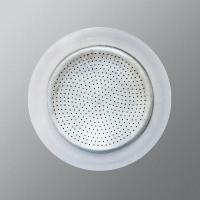Legnoart moka pot review
This moka pot from the Italian kitchen design brand Legnoart stands out by having a ceramic upper chamber, which is quite nice — but otherwise is a bit of a let down.
It seems the invisible hand of the market agrees with our assessment, as this moka pot is no longer available to buy anywhere. (We were given it to review)
Table of contents
Product recommendation

Taste
Like most of the moka pots we've tested this one creates bitter watery coffee — definitely not the worst we've reviewed, but not worth buying (you can't anyway) when there are better alternatives.
It does have a good coffee to water ratio for a moka pot, which probably explains why it wasn't undrinkable.

Usability and cleaning
At first it seems like the ceramic upper chamber would have some kind of benefit — maybe once you've brewed your coffee, you could serve it from the ceramic — but in practice this doesn't work, as you need to unscrew the top from the very hot lower chamber, which is fiddly and dangerous. So, the top is just for aesthetics.
Minor usability issues
- Unlike most moka pots the lid isn't on a hinge. Instead a little protrusion in the lid fits into a little gap in the rim of the upper chamber. Then when you turn the lid, the protrusion fits under the lip preventing the lid from falling off when you pour it. This is an understandable result of using ceramic as a material, but a little annoying.
- It has no indicator showing how high to fill the water.
- The coffee dribbles a little when it pours.

Good usability features
- It's easy to clean.
- It's compatible with induction hobs.
Aesthetics
Aesthetically it looks okay, it's a little chunky. If the bottom was somehow ceramic too it would look nice, but instead it just looks like two materials needlessly mashed together.
The ceramic interior looks a bit like a ghost — which is nice.

Sustainability and repairability
This moka pot doesn't seem to be available to buy anywhere online — nor does there seem to be any information on parts. So although moka pots are generally a more sustainable way of making coffee — this one will last you until it breaks, and then no more.

The combined materials also make it harder to recycle the metal components.

Moka pots
Moka Pot Gasket Size Finder